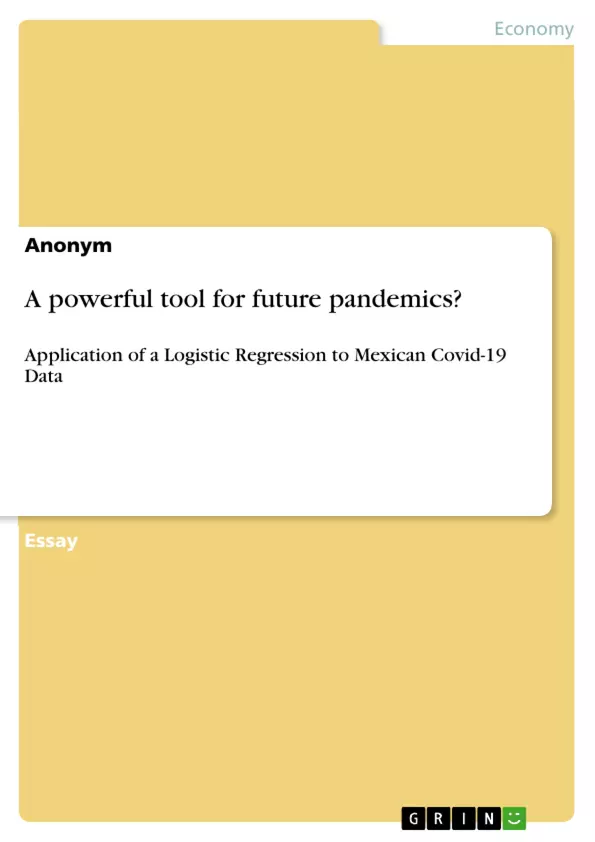In many areas of science as well as in practice in economics, politics, etc., it is a matter of determining the probability of the occurrence of a certain event. In the field of marketing, for example, it is interesting to know which factors increase the probability of a purchase, in the field of medicine it is important to know which factors increase the risk of an illness, and in politics it will be of interest to determine the effects of certain variables on the probability of being elected. All these events can be viewed as dichotomous (binary) variables (purchase - non-purchase; disease - non-disease; election - non-election; etc.). It is precisely in these cases, when the dependent variable is dichotomous, that linear regression fails to provide a satisfactory answer. The probability for the occurrence of the event (dependent/endogenous/explained variable or regressand or also called prognosis variable) is therefore 1 minus the probability for the non-occurrence of the event. With the help of logistic regression the probabilities for the occurrence of an event can be calculated. On the one hand, this method has similarities to discriminant analysis in that it is a two-group approach. On the other hand, there are similarities to linear regression analysis, since the independent variables (exogenous/explanatory variables, regressor or predictor variables) are weighted via a regression approach (see Backhaus, p. 284).
In Machine Learning and Medicine Logistic regression is widely used. Machine Learning can have a major impact in medicine since it helps analyze an enormous amount of data (See Tripepi et., 2008, p.808). This papers aim is to create a machine learning tool with logistic regression that analyzes Covid-19 Data from Mexico. In future pandemics such an algorithm could help physicians and health authorities to answer questions like: Who should be vaccinated first or who has a higher risk of a severe course of the disease? Answering these kind of questions quick and based on data could save a lot of resources and could dampen the course of the pandemic. Furthermore it simplifies difficult decisions and could also provide help for decision making in a Triage-Situation when resources are scarce.
Inhaltsverzeichnis (Table of Contents)
- LISTS.
- LIST OF FIGURES
- LIST OF TABLES
- INTRODUCTION.
- METHODOLOGY.
- WHY NOT LINEAR REGRESSION?
- LOGISTIC REGRESSION IS THE SOLUTION.
- APPLICATION OF LOGISTIC REGRESSION ALGORITHM TO COVID19 DATA FROM MEXICO.....
- WHAT INFLUENCES THE COURSE OF AN INFECTION?
- EXPLORATORY DATA ANALYSIS AND DATA CLEANING
- PREDICTION WITH A LOGISTIC REGRESSION MODEL......
- CONCLUSION
- REFERENCES.............
Zielsetzung und Themenschwerpunkte (Objectives and Key Themes)
The objective of this paper is to develop a machine learning tool using logistic regression to analyze Covid-19 data from Mexico. This tool aims to assist physicians and health authorities in addressing critical questions related to the pandemic, such as identifying individuals who require priority vaccination and those at higher risk of severe disease. The goal is to leverage data-driven insights for efficient resource allocation and mitigation strategies.
- The application of logistic regression to predict the probability of specific events, specifically in the context of Covid-19 infections.
- The exploration of key factors influencing the severity of Covid-19 infections.
- The utilization of machine learning techniques for analyzing large datasets and informing healthcare decision-making.
- The potential of data-driven approaches in pandemic management, particularly for resource allocation and risk assessment.
- The use of machine learning to assist in pandemic mitigation strategies and resource optimization.
Zusammenfassung der Kapitel (Chapter Summaries)
The introduction delves into the significance of determining the probability of events, particularly in fields like marketing, medicine, and politics. It highlights the limitations of linear regression in handling dichotomous dependent variables and introduces logistic regression as a suitable alternative. The methodology chapter explains the rationale behind choosing logistic regression over linear regression, showcasing its effectiveness in addressing classification problems and predicting the probability of events.
Schlüsselwörter (Keywords)
Logistic regression, machine learning, Covid-19, pandemic, data analysis, healthcare, risk assessment, resource allocation, decision-making, prediction, classification, Mexico.
Frequently Asked Questions
Why is logistic regression used instead of linear regression in this study?
Linear regression fails to provide satisfactory answers when the dependent variable is dichotomous (binary). Logistic regression is better suited for predicting the probability of events like "disease" or "no disease."
What is the main goal of the machine learning tool described?
The goal is to analyze Covid-19 data from Mexico to help health authorities identify high-risk individuals and optimize vaccine allocation.
How can this algorithm assist in a triage situation?
By providing data-driven insights into the risk of severe disease progression, it helps physicians make difficult decisions when medical resources are scarce.
What kind of data was used for the application?
The tool was applied to Covid-19 data sets from Mexico, undergoing exploratory data analysis and cleaning before making predictions.
What are the similarities between logistic regression and discriminant analysis?
Both are considered two-group approaches used to classify observations into one of two distinct categories based on independent variables.
- Quote paper
- Anonym (Author), 2023, A powerful tool for future pandemics?, Munich, GRIN Verlag, https://www.grin.com/document/1394994



